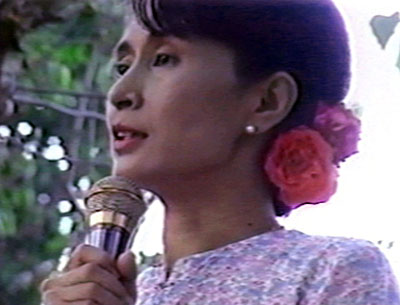YANGON, (Reuters) – Aung San Suu Kyi, who went from English housewife to Myanmar’s oppposition leader and world famous political prisoner, is a powerful symbol of the struggle against dictatorship in one of the world’s most oppressive countries.
Detained for 15 of the past 21 years, the 65-year-old pro-democracy leader was freed today after her latest period of house arrest expired. She immediately told thousands of cheering supporters to work for unity in the army-run country.
“There is a time to be quiet and a time to talk. People must work in unison. Only then can we achieve our goal,” Suu Kyi told supporters at the gates of her lakeside compound.
Yet despite her steely determination in confronting the generals, the former Burma has moved no closer to democracy after 48 years of brutal military rule, holding an election on Sunday that the military junta’s party won easily.
Slightly built and soft-spoken, she won the Nobel Peace Prize in 1991 and plays a crucial role in keeping world attention on Myanmar’s military junta and its human rights record.
Known simply as “The Lady” by millions of her countrymen, she refuses to give up on the resource-rich country. “For me, real freedom is freedom from fear and unless you can live free from fear you cannot live a dignified human life,” she once said.
Her National League for Democracy (NLD) won the country’s last elections, in 1990, by a landslide, but has never been allowed to govern. After deciding not to contest Sunday’s election, her party was disbanded by the junta.
She was due to be released on May 27 last year. That changed when an American intruder swam to her lakeside home just weeks before she was to be freed, claiming God had sent him to warn her she would be the target of an assassination plot.
She was sentenced to house arrest the following August for allowing the intruder, John Yettaw, to stay two nights, which was deemed to be an infringement of security laws.
She was last freed in May 2002 and immediately travelled the country to meet supporters, drawing huge crowds — and increasing hostility from backers of the military government.
Then, on May 30, 2003, Suu Kyi and her convoy were, according to rights groups, ambushed and attacked by government-affiliated thugs. Dissidents in exile suspect more than 70 NLD followers were killed.
The military blamed the clashes on Suu Kyi and placed her under “protective custody” at a secret location, sparking international outrage and sanctions from the West and an unprecedented rebuke from Yangon’s neighbours.
Since major surgery in September 2003, she has been confined to her home on Yangon’s University Avenue, a prisoner in all but name, without the use of a telephone and with her visitors restricted.
“SECOND STRUGGLE”
Suu Kyi spent much of her life abroad before returning to her family’s home on Yangon’s Inya Lake in April 1988 to care for her ailing mother just as resentment of military rule boiled over into pro-democracy protests across the country.
She first spoke to crowds of protesters from the steps of the capital’s historic Shwedagon Pagoda on Aug. 26 that year.
People seeing her for the first time were struck by the resemblance to her father, General Aung San, the country’s foremost national hero who led Myanmar to the brink of independence from British rule before his assassination in 1947.
“I could not, as my father’s daughter, remain indifferent to all that was going on,” Suu Kyi, who was two when her father died, told the huge crowd.
The military crushed the democracy uprising the following month. Thousands were killed and imprisoned but the generals promised an election.
In 1989, Suu Kyi broke a taboo by publicly attacking retired dictator Ne Win as the source of Myanmar’s ills.
This sealed her popular appeal, but also her fate — she was placed under house arrest on July 19, 1989, and remained there for six years. She passed the time with study, Buddhist meditation and playing piano.
Her message to the military has always been loud and clear — she wants an open dialogue with the junta and Myanmar’s ethnic minorities to try to end the political stalemate.
The generals have refused to recognise her, questioning her patriotism by calling her by her married name, “Mrs Michael Aris”, and accusing her of being a traitor and a tool of Britain and the United States and their neo-colonial designs.
Suu Kyi’s struggle has drawn comparisons to South Africa’s Nelson Mandela and India’s Mahatma Gandhi — freedom fighters from whom she has drawn inspiration over the years.
She is now the world’s most famous prisoner of conscience, but her fight has come at great personal cost.
She has always refused to leave Myanmar, for fear of not being allowed back. Her husband, an Oxford academic, was denied a visa to visit her, even when he was dying of prostate cancer.
Aris died in March 1999 and Suu Kyi declined an offer from the junta to leave the country to attend his funeral.
Suu Kyi was born in Yangon, then called Rangoon, on June 19, 1945. She was educated in Myanmar and India, where her mother was an ambassador, and later studied at Oxford.
In 1972, she married Aris and they raised two sons — Alexander and Kim — while moving between Bhutan, India and Japan before settling in Oxford.
Suu Kyi, who says arrests for her and other activists are an “occupational hazard” of the democracy movement, has always played down the hardships she has faced compared with those the Myanmar people have endured.
“What we have is perseverance. It is not patience, it is perseverance. We are prepared to persevere whatever the obstacles,” she told Reuters in 2002.





